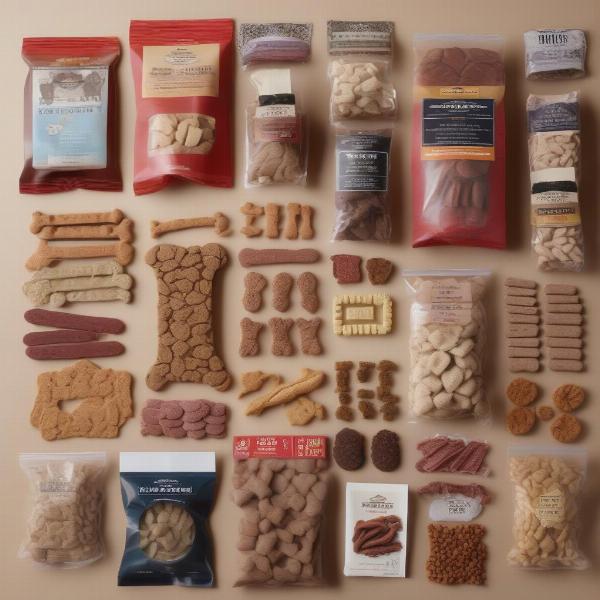Reward dog food, often in the form of treats, plays a crucial role in training and reinforcing positive behaviors in dogs. Whether you’re housebreaking a puppy, teaching basic commands, or working on advanced tricks, the right reward food can make all the difference. Choosing the best treats for your dog involves considering factors like ingredients, size, and your dog’s individual preferences and dietary needs. This guide explores the world of reward dog food, helping you make informed choices for your furry companion.
Choosing the Right Reward Dog Food
Selecting the best reward dog food requires understanding your dog’s needs and the various treat options available. Consider your dog’s size and breed – smaller dogs may require smaller treats to avoid overfeeding, while larger breeds can handle bigger bites.
Look for treats made with high-quality, digestible ingredients. Avoid artificial flavors, colors, and preservatives. Opt for natural options like raw dog food treats or human grade dog treats if you prioritize whole, minimally processed ingredients. Also, consider any allergies or sensitivities your dog may have. If your dog suffers from allergies, explore hypoallergenic food dogs and treats.
Using Reward Dog Food for Training
Reward dog food is an essential tool for effective training. Positive reinforcement, using treats to reward desired behaviors, is a powerful method for teaching your dog new commands and shaping their behavior. Start with small, easily chewable treats for quick rewards during training sessions. Consistency is key – reward your dog immediately after they perform the desired action to create a clear association.
Different Types of Reward Dog Food
From crunchy biscuits to soft chews, a vast array of reward dog food options caters to different preferences and training needs. Freeze-dried treats retain much of their nutritional value and offer a flavorful reward. Training treats are often small and easily digestible, ideal for repetitive rewards during training.  Different Types of Reward Dog Food
Different Types of Reward Dog Food
Some owners prefer making their own dog treats, allowing for complete control over the ingredients. This can be especially beneficial for dogs with specific dietary restrictions.
Dr. Emily Carter, a certified veterinary nutritionist, recommends, “When using treats for training, remember to factor them into your dog’s daily caloric intake to prevent overfeeding.”
Reward Dog Food for Different Life Stages
Puppies, adult dogs, and senior dogs have varying nutritional needs. Puppies benefit from soft, easily digestible treats that support their growth and development. Adult dogs can enjoy a wider variety of textures and flavors. Senior dogs may require softer treats due to dental issues.
Beyond Treats: Other Forms of Reward
While food is a powerful motivator, other forms of reward can also be effective. Praise, petting, and playtime can be used in conjunction with or as alternatives to treats. Understanding your dog’s individual preferences will help you choose the most effective rewards.
John Davis, a professional dog trainer, suggests, “Varying the type of reward keeps training sessions engaging and prevents your dog from becoming bored.”
Conclusion
Reward dog food is an invaluable tool for training and strengthening the bond with your furry friend. By choosing high-quality treats and using them effectively, you can motivate your dog to learn, grow, and develop positive behaviors. Remember to consider your dog’s individual needs and preferences when selecting reward food and incorporate other forms of positive reinforcement for a well-rounded training approach.
FAQs
- How many treats should I give my dog per day? Treats should make up no more than 10% of your dog’s daily caloric intake.
- What are some healthy treat options for dogs with allergies? Look for limited-ingredient treats made with novel proteins and avoid common allergens like chicken, beef, and wheat.
- Can I use human food as dog treats? Some human foods are safe for dogs, but many are toxic. Consult with your veterinarian before giving your dog any human food.
- What if my dog isn’t motivated by food rewards? Try other forms of reward like praise, petting, or toys.
- How can I prevent my dog from becoming overweight from treats? Factor treats into their daily caloric intake and adjust their meal portions accordingly.
- Are there any treats specifically designed for training? Yes, many small, easily digestible treats are designed specifically for training sessions.
- Can I make my own dog treats? Yes, making homemade treats gives you control over ingredients and can be a fun activity.
Related Articles
About ILM Dog
ILM Dog is your trusted global resource for all things dog-related. We offer expert advice on dog breeds, health, training, nutrition, grooming, and much more. From puppy care to senior dog support, we provide practical guidance to dog owners of all experience levels. For personalized support with your dog’s nutrition or finding the perfect reward food, contact us at [email protected] or +44 20-3965-8624. ILM Dog is committed to helping you provide the best possible care for your canine companion.